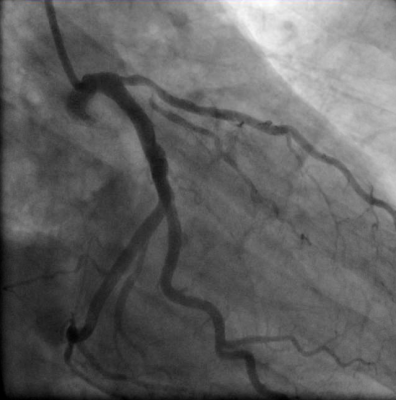
April 3, 2017 — The influence of cardiac arrest and cardiogenic shock on outcomes of patients with ST-elevation myocardial infarction (STEMI) has not been completely studied. Researchers at the Minneapolis Heart Institute Foundation (MHIF) conducted a study to determine the incidence, characteristics and outcomes of STEMI complicated by cardiac arrest with or without cardiogenic shock.
Prospective data from the Level I regional STEMI program at the Minneapolis Heart Institute at Abbott Northwestern Hospital was examined from March 2003 to December 2014. Researchers analyzed STEMI patients who had cardiac arrest prior to any intervention. They specifically sought to determine how the type of cardiac arrest (shockable versus non-shockable rhythm) and the presence of cardiogenic shock affect patient outcomes.
MHIF researchers, led by Benjamin Johnson, M.D., enrolled 4,511 patients in this study. The incidence of cardiac arrest prior to intervention was 11 percent. In-hospital death occurred in 250 (6 percent) of patients. Cardiac arrest was present in 56 percent and cardiogenic shock in 53 percent of these patients. In patients with shockable cardiac arrest, in-hospital mortality was 2.8x higher if they had cardiogenic shock as compared to no cardiogenic shock. In patients with non-shockable cardiac arrest, in-hospital mortality was equally high regardless of the presence of cardiogenic shock. Among this 4,511-patient cohort, cardiac arrest and/or cardiogenic shock accounted for 76 percent of all hospital deaths.
Johnson noted, “Cardiac arrest and cardiogenic shock are associated with significantly increased morbidity and mortality in patients presenting with ST elevation myocardial infarction. Efforts need to be made to better understand this population of patients presenting with STEMI complicated by cardiac arrest with or without cardiogenic shock.”
Results of the study were presented at the American College of Cardiology Annual Scientific Session & Expo (ACC.17), March 17-19 in Washington, D.C.
Watch the VIDEO "VIDEO: Cardiogenic Shock Supported With Impella Shows Good Outcomes."
For more information: www.mplsheart.org


 July 31, 2024
July 31, 2024 









